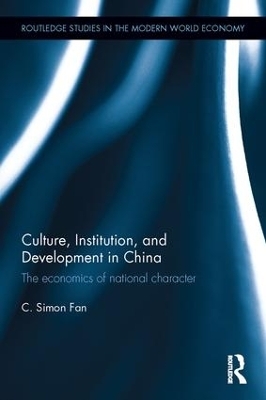
Culture, Institution, and Development in China
Routledge (Verlag)
978-1-138-18571-5 (ISBN)
C. Simon Fan is a Professor of Economics at Lingnan University, Hong Kong.
1. Introduction Part 1: Geography, Nomadic Threat, and the Size of Ancient China 2. Why Has China Stayed a Single Big Country? 3. How Can a Large Agrarian Country Deter Powerful Horse Warriors? 4. How Did China Become a Single Big Country? 5. The Threat from the United Nomad Country and the Start of the United Chinese Empire Part 2: The Formation of National Character in Ancient China 6. From the "Burning of Books and Burying of Scholars" to the Ideology of Confucianism 7. Economics of the Optimal Personality in Ancient China 8. Meritocracy in Ancient China: Keju 9. Personality and Culture of Lawless (Nomadic) Tribes Part 3: How Did the Ancient Dynasties Manage the Large Country of China? 10. From the Tang Dynasty to the Yuan Dynasty 11. The Ming Dynasty 12. The Qing Dynasty Part 4: An Introduction to Ancient Japan and the First Sino-Japanese War 13. Bushido: The Soul of (Ancient) Japan 14. Wo-Kou: Short Japanese Bandits and Weak Chinese Militias in the Ming Dynasty 15. The Arrival of Perry, Meiji Restoration, and Rise of Japan 16. The First Sino-Japanese War Part 5: National Humiliations in the Late Qing Dynasty and the "New Culture" Movement 17. National Humiliation at the End of the Qing Dynasty 18. New Culture Movement Part 6: Japanese Atrocities and the Transformation of the Chinese Personality 19. Japan’s Invasion of Manchuria 20. Japanese Rule of Manchuria: Why Was It A Success? 21. The Second Sino-Japanese War 22. Japanese Atrocities and American Participation in the Sino-Japanese War 23. Japanese Atrocities and the Growth of Chinese Communist Troops 24. Who Killed 2.12 Million Japanese Troops in World War II? 25. War Rape and "Comfort Women" 26. Japanese Atrocities and the Transformation of the Chinese Personality Part 7: The Establishment of Communist China and the Chinese National Character 27. Korean War 28. Cultural Revolution 29. Epilogue
| Erscheinungsdatum | 25.05.2016 |
|---|---|
| Reihe/Serie | Routledge Studies in the Modern World Economy |
| Zusatzinfo | 6 Tables, black and white |
| Verlagsort | London |
| Sprache | englisch |
| Maße | 156 x 234 mm |
| Gewicht | 566 g |
| Themenwelt | Geisteswissenschaften ► Geschichte ► Geschichtstheorie / Historik |
| Sozialwissenschaften ► Soziologie ► Spezielle Soziologien | |
| Wirtschaft ► Allgemeines / Lexika | |
| Wirtschaft ► Volkswirtschaftslehre | |
| ISBN-10 | 1-138-18571-X / 113818571X |
| ISBN-13 | 978-1-138-18571-5 / 9781138185715 |
| Zustand | Neuware |
| Haben Sie eine Frage zum Produkt? |
aus dem Bereich


